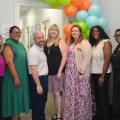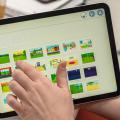Language Development
At what age should my baby begin talking?
Language development is an ongoing process. At two to four months of age, babies coo, making vowel sounds like ah or eh. By six months, babies will laugh out loud or jabber, making consonant sounds like ba or ga. Real words start sometime around 9 months of age. This is when babies start to say "Dada" or "Mama." '
Along with referring to Dad and Mom as "Dada" or "Mama" at one year of age, children should also be using at least one other word. Vocabulary builds so that by eighteen months, most children can say at least five words. By two years of age, children should be making simple, two-word sentences ("Daddy go" or "doggy bye-bye") and have a vocabulary of at least fifty words.
Besides forming sounds and words, language entails gesturing and understanding. It is important for parents to realize that language comprehension normally surpasses the ability to form words at any age. Babies should smile interactively by three months and look alert. By nine months, a baby should turn to the sound of someone saying his name. By one year, a baby should be pointing at objects of interest and bringing objects to parents and caregivers to show. By eighteen months, the child should understand at least fifty words. By two years, a child should understand a two-step command such as, "Go get your toy and bring it here."
For more information, check out the following publications:
IS1601 - Did You Know at 1 Month I Can
IS1600 - Did You Know at 2 Months I Can
IS1604 - Did You Know at 3 Months I Can
IS1637 - Did You Know at 4 Months I Can
IS1640 - Did You Know at 5 Months I Can
IS1641 - Did You Know at 6 Months I Can
IS1642 - Did You Know at 7-8 Months I Can
IS1643 - Did You Know at 9-12 Months I Can
What can I do to help my child develop language skills?
Use these helpful tips to help your child develop language skills.
- Talk and read to your child often.
- When you are playing with your child, name objects: "This is a spoon." or "See the lamp."
- Describe what you are doing: "Daddy is getting the chicken out of the oven. The oven is hot."
- Repeat words and phrases often: "The oven is hot, hot, very hot. Don't touch."
- Use a big vocabulary and then define the words: "Mommy is exhausted - tired, tired. Mommy wants to sleep."
- Use picture books when "reading" to your infants.
- Use simple stories when reading to infants and children.
- Preschoolers enjoy rhyming stories.
- Remember that it's never too late to start reading to your child.
For more information, see P1708 - Start Early with Books.
What can I do to help my child read well?
- Read to or with your children for 30 minutes every day. It is important to read to your children before they start school.
- Talk with infants and toddlers using short simple sentences before they learn to read. This will help them later when they learn to read or write.
- Help your children read on their own. This will help them do better in school. Reading at home helps children do better in school.
- Make sure your children understand that reading is important. Set a good example for your children by reading newspapers, magazines and books.
- Set up a reading area in your home. Keep books that interest your children in places where they can easily reach them.
- Help your children learn how to write by having paper, pencils, pens or crayons for them in your home. Help your children write if they ask you.
- Communicate with your children as you do daily activities together. When you take your children places, talk with them about what you are doing and ask them questions.
- Ask your children to describe events in their lives. Talking about their experiences makes children think about them.
- Restrict the amount and kind of TV your children watch. Watch educational TV programs with your children that teach letter sounds and words or give information about nature and science. NOTE: According to the Academy of Pediatrics, children under age 2 should not be exposed to television.
- Visit your children's schools and classrooms to learn how your children are doing in school. Ask about their progress and where your children need help.
For more information, visit US Department of Education.
Publications
News
Do you know what technoference is? Chances are you’ve experienced it, whether you are familiar with the term or not.
GLUCKSTADT, Miss. -- Children, parents and child care providers in the Gluckstadt area now have a new learning center with free resources. The Mississippi LIFT Resource and Referral Network at the Mississippi State University Extension Service provides mini-learning stations throughout the center with themed hands-on, play-based educational activities each month. Various free services are available through the center, including an educational lending library, referrals for teacher training, and family support services training.
STARKVILLE, Miss.





